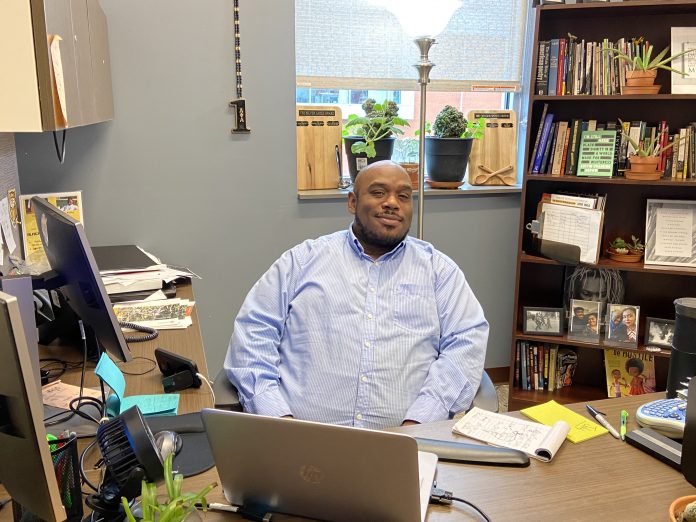
Joseph Harris, originally from Prince George’s County, Maryland, is the new CDI coordinator. Harris is a poet and is working towards a PhD in urban education literacy at Michigan State University’s College of Education.
The DePauw: What do you do in the Greencastle community?
Joseph Harris: My wife was here [and] is an associate professor of sociology. Her name is Dr. Goins. So when I first moved up here, I started to look for a community. Coming to a small town, in this type of area can be culturally jarring. So, me and a friend of mine—his name is Russell Harvey—one of the first things that we did, he had the idea to restart the NAACP out here. I'm currently the Vice President of the Greencastle branch of the NAACP. I do some book reviews for a website called Black Nerd problems. This is kind of fun too. This is one of those things where right now you're seeing more people of color becoming interested in comics and in areas that were traditionally thought of as not Black.
TDP: Why did you accept this position?
JH: I feel like you should find a space where you can engage in meaningful work. I'm sort of interested in intersections between diversity and the lack thereof, and how that can affect a community. And so that same sort of work can be done through this position. I've always worked with student groups. I've been an advisor for fraternities, I've been an advisor for student groups. I've worked one on one as a mentor with groups from the students from K through 12 through college. And so I've always been interested in how students create community. One of the ways I think we can improve the academic progress of students of color and other traditionally marginalized communities here at DePauw, is by giving them a community and interesting programming by strengthening the groups that they already have here. Before I started working here, I thought I brought something to the community into the DePauw that might have been missing.
TDP: How do you hope to assist students?
JH: The first thing I did was I listened, I said, 'Hey, I want to meet a bunch of students', I want to meet with my student groups. I wanted to find out what they felt I could do to help. Then I talked to staff and I talked to my boss and I talked to the faculty and I said, ‘What do you think I could do to help?.’ Then I started coming up with different ideas based on what kind of responses I got. One thing I did was, I took some programs that were already in place. And then there's different programs that I sort of tried to brainstorm and try to figure out, ‘Hey, there's something that may be missing here,’ are you guys interested in this and then finding appropriate organizations to sort of partner with me on that. I think it's a combination of trying to see what's here that I can fit in and I can assist on and what's here that's missing that I can bring.
TDP: How did you know you wanted to do this kind of work?
JH: If you are a person who has enjoyed a lot, you also have a responsibility to give back. And a lot of times, issues within the Black community aren't just issues within the Black community, traditionally, marginalized people are traditionally marginalized for a reason. And if you can find ways to systematically raise the profile of people, all people can benefit from that. I've always known that the work I wanted to do would help the voiceless have a voice. I think you have to find your strengths and when I speak, I'm rarely misunderstood. If you know you're blessed with a big voice, part of your responsibility is to help people who don't have a big voice. I've been blessed to have people who mentored me and trained me and helped educate me in different ways to help to sort of navigate systems. I kind of have a good handle on how to navigate systems. It’s been sort of one of my gifts. And I think I've always felt that responsibility to use that gift for the greater good.
TDP: What advice would you give to students?
JH: I think you have to get people to trust you. So my advice to people who are going to give advice is make sure that the people who you're giving advice to trust you. If people don't trust you, you could tell them the sky is blue, and they wouldn't believe you. If people trust you, they'd be willing to run into a forest fire for you. I think the best piece of advice is, be wise enough to know when you're not wise enough to know something. Be humble and be willing to serve. I think another good piece of advice is be willing to help people where they need help, not where you want to help them.
